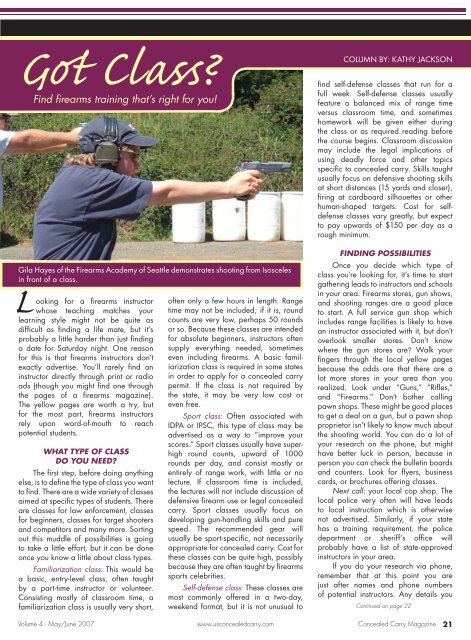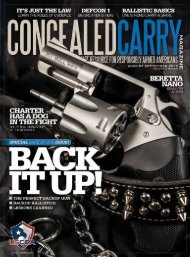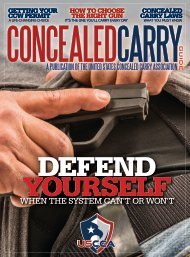You also want an ePaper? Increase the reach of your titles
YUMPU automatically turns print PDFs into web optimized ePapers that Google loves.
COLUMN By: kathy jacksonfind self-defense classes that run for afull week. Self-defense classes usuallyfeature a balanced mix of range timeversus classroom time, and sometimeshomework will be given either duringthe class or as required reading beforethe course begins. Classroom discussionmay include the legal implications ofusing deadly force and other topicsspecific to concealed carry. Skills taughtusually focus on defensive shooting skillsat short distances (15 yards and closer),firing at cardboard silhouettes or otherhuman-shaped targets. Cost for selfdefenseclasses vary greatly, but expectto pay upwards of $150 per day as arough minimum.Gila Hayes of the Firearms Academy of Seattle demonstrates shooting from Isoscelesin front of a class.ooking for a firearms instructorwhose teaching matches yourlearning style might not be quite asdifficult as finding a life mate, but it’sprobably a little harder than just findinga date for Saturday night. One reasonfor this is that firearms instructors don’texactly advertise. You’ll rarely find aninstructor directly through print or radioads (though you might find one throughthe pages of a firearms magazine).The yellow pages are worth a try, butfor the most part, firearms instructorsrely upon word-of-mouth to reachpotential students.WHAT TYPE OF CLASSDO YOU NEED?The first step, before doing anythingelse, is to define the type of class you wantto find. There are a wide variety of classesaimed at specific types of students. Thereare classes for law enforcement, classesfor beginners, classes for target shootersand competitors and many more. Sortingout this muddle of possibilities is goingto take a little effort, but it can be doneonce you know a little about class types.Familiarization class: <strong>This</strong> would bea basic, entry-level class, often taughtby a part-time instructor or volunteer.Consisting mostly of classroom time, afamiliarization class is usually very short,often only a few hours in length. Rangetime may not be included; if it is, roundcounts are very low, perhaps 50 roundsor so. Because these classes are intendedfor absolute beginners, instructors oftensupply everything needed, sometimeseven including firearms. A basic familiarizationclass is required in some statesin order to apply for a concealed carrypermit. If the class is not required bythe state, it may be very low cost oreven free.Sport class: Often associated withIDPA or IPSC, this type of class may beadvertised as a way to “improve yourscores.” Sport classes usually have superhighround counts, upward of 1000rounds per day, and consist mostly orentirely of range work, with little or nolecture. If classroom time is included,the lectures will not include discussion ofdefensive firearm use or legal concealedcarry. Sport classes usually focus ondeveloping gun-handling skills and purespeed. The recommended gear willusually be sport-specific, not necessarilyappropriate for concealed carry. Cost forthese classes can be quite high, possiblybecause they are often taught by firearmssports celebrities.Self-defense class: These classes aremost commonly offered in a two-day,weekend format, but it is not unusual toFINDING POSSIBILITIESOnce you decide which type ofclass you’re looking for, it’s time to startgathering leads to instructors and schoolsin your area. Firearms stores, gun shows,and shooting ranges are a good placeto start. A full service gun shop whichincludes range facilities is likely to havean instructor associated with it, but don’toverlook smaller stores. Don’t knowwhere the gun stores are? Walk yourfingers through the local yellow pagesbecause the odds are that there are alot more stores in your area than yourealized. Look under “Guns,” “Rifles,”and “Firearms.” Don’t bother callingpawn shops. These might be good placesto get a deal on a gun, but a pawn shopproprietor isn’t likely to know much aboutthe shooting world. You can do a lot ofyour research on the phone, but mighthave better luck in person, because inperson you can check the bulletin boardsand counters. Look for flyers, businesscards, or brochures offering classes.Next call: your local cop shop. Thelocal police very often will have leadsto local instruction which is otherwisenot advertised. Similarly, if your statehas a training requirement, the policedepartment or sheriff’s office willprobably have a list of state-approvedinstructors in your area.If you do your research via phone,remember that at this point you arejust after names and phone numbersof potential instructors. Any details youContinued on page 22Volume 4 - May/June 2007 www.usconcealedcarry.com<strong>Concealed</strong> <strong>Carry</strong> Magazine 21
















